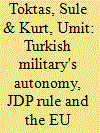| Srl | Item |
| 1 |
ID:
153589


|
|
|
|
|
| Summary/Abstract |
Properties belonging to Ottoman Armenians and Greeks were seized through various laws, decrees and other legal regulations passed by the Committee of Union and Progress (hereafter CUP) government, and later the cadres of the Republican regime. Both governments concocted ways of making this illegal process look legitimate by using the legal veil of the law. Central to this process were the economic outcomes of violence committed against Armenians and Greeks. The aim of this article is to analyze these laws and statutes, which were known as the Abandoned Properties Laws, and discuss the impact of this legislation on the process of the changing of hands of Armenian and Greek properties. It attempts to elucidate the dominant logic of the laws, decrees, and regulations concerning the abandoned properties in the periods of 1915–1923 and post-1923.
|
|
|
|
|
|
|
|
|
|
|
|
|
|
|
|
| 2 |
ID:
099486


|
|
|
|
|
| Publication |
2010.
|
| Summary/Abstract |
This article tackles the question of Europeanization in Turkey's civil-military relations and the extent to which the EU has served as an anchor in the civilian control over the Turkish Armed Forces. We argue that the EU membership process has necessitated democratization in civil-military relations; EU support was not sufficient for fully integrated democratic control of the armed forces (DECAF) as there are still problems in the democratization of civil-military relations. Since the 2000s, there has been a DECAF reform process taking place but due to historical deficiencies in Turkish polity, like the civilian incapacity to change the priority given to the military's role in the making of the security culture, the European norms of DECAF, such as a constitutional division between the civilian and military authorities, political neutrality of the military and parliamentary control of the defense budget, is formal. In the first part, we aim to give background information to DECAF reforms in Turkey. The second part discusses Justice and Development Party (JDP)-Turkish General Staff (TGS) relations between 2002 and 2007. The third part assesses civil-military relations in the period since 2007. The last section pays special attention to the significance of the question of a Turkish way to Europeanization especially in the field of civil- military relations.
|
|
|
|
|
|
|
|
|
|
|
|
|
|
|
|